From the 'Arsenal of the North' to a rollercoaster run for Doncaster Rovers: Revisiting The Catt Chronicles - pt5
and live on Freeview channel 276
Each piece covered a ten year period in Rovers’ history, with Catt reflecting on the big events and recollecting the managers and top players of the time.
Here, we conclude our revisit of the series, as we look at part five which covers 2006/07 to 2015/16.
*************
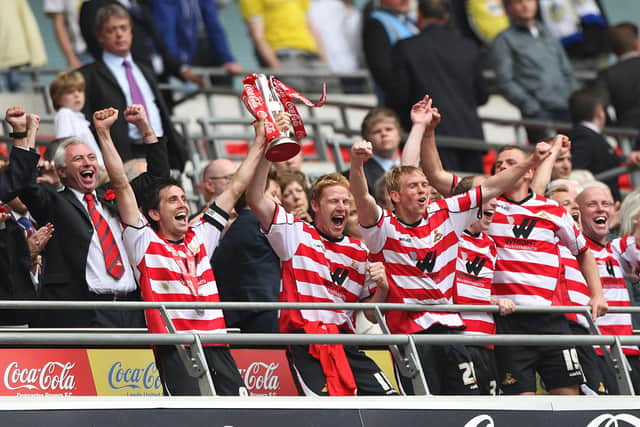

Advertisement
Hide AdAdvertisement
Hide AdAnd so we come to the final decade plus one year, of course, as we can’t ignore Rovers’ wonderful achievement last season.
The last ten years have been remarkably volatile with six of them resulting in either promotion or relegation.
But the early part of the decade was one of stability and outstanding progress guided by the unassuming hand of a manager quite unlike any I had come across before.
MANAGERS
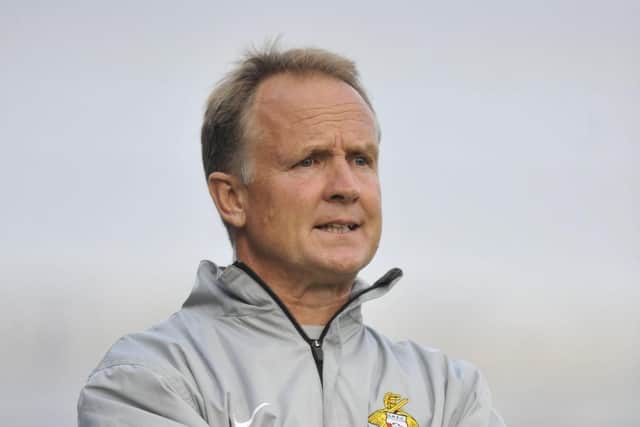

Sean O’Driscoll was appointed in September 2006 after Dave Penney’s successful reign had come to an end following one win in the first five league games that season.
Advertisement
Hide AdAdvertisement
Hide AdPenney allegedly left by ‘mutual agreement’ although it was clear that the relationship he enjoyed with club chairman John Ryan, with whom he had always worked closely, had deteriorated and was under strain.
But any criticism over Penney’s surprise departure quickly faded once O’Driscoll got into his stride.
The former Bournemouth boss had been headhunted by Ryan who had long admired the way his teams played with the emphasis on possession, passing and pure football.
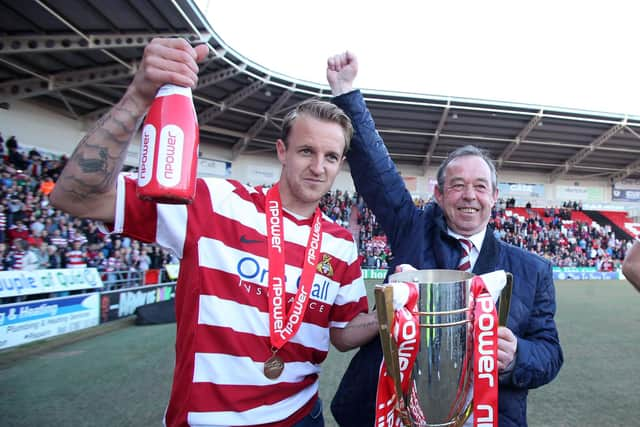

In the early days I was a bit puzzled by O’Driscoll’s approach to the game.
Advertisement
Hide AdAdvertisement
Hide AdVirtually all the managers I had dealt with in the past, and there were many, had preached the value of keeping the game simple and not overburdening players with too much information.
To me O’Driscoll seemed to have a more complicated approach based on the mantra, which he drilled into his players, of understanding their roles which might differ at any given time during the game and taking responsibility by adapting to the changing circumstances.
But eventually I realised it wasn’t really at variance to the managers who had gone before him – just presented in a different way.
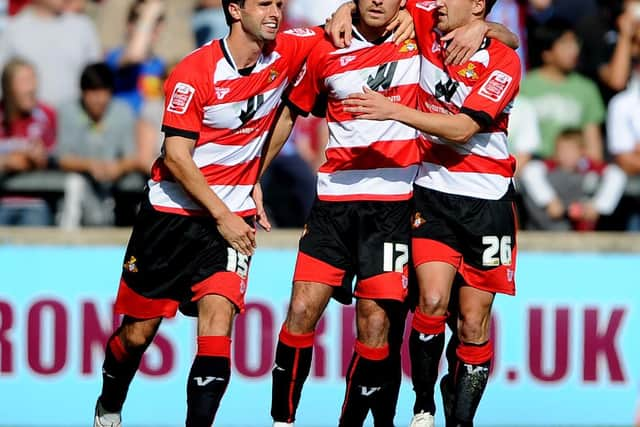

Whatever the semantics of the situation once the players bought in to what O’Driscoll wanted them to do it resulted in an era of wonderful football and a return to the second tier for the first time in fifty years.
Advertisement
Hide AdAdvertisement
Hide AdIt wasn’t plain sailing from the start though as it took the new boss seven attempts before winning a game and there were more than a few boos ringing out during that time.
But the jeers had turned into cheers by the end of the season as Rovers finished in the top half of the table and O’Driscoll led the club to their first major final when they won the Johnstone’s Paints Trophy in front of more than 55,000 fans at Cardiff’s Millennium Stadium.
The 20006/7 season marked two more milestones in the club’s history when Terry Bramall and Dick Watson joined the Board in November, and on December 23 Rovers played their last match at Belle Vue marking the occasion with a 1-0 win over top of the table Nottingham Forest.
On loan teenager Theo Streete, who only played half a dozen games for the club, wrote himself into the record books as the last man to score for Rovers at the ground which had been their home for 84 years.
Advertisement
Hide AdAdvertisement
Hide AdTheir first match at the Keepmoat stadium on New Year’s Day 2007 resulted in an emphatic 3-0 victory over Huddersfield Town with Mark MCammon having the distinction of being the first scorer in the new ground after only nine minutes in front of 14,470 fans.
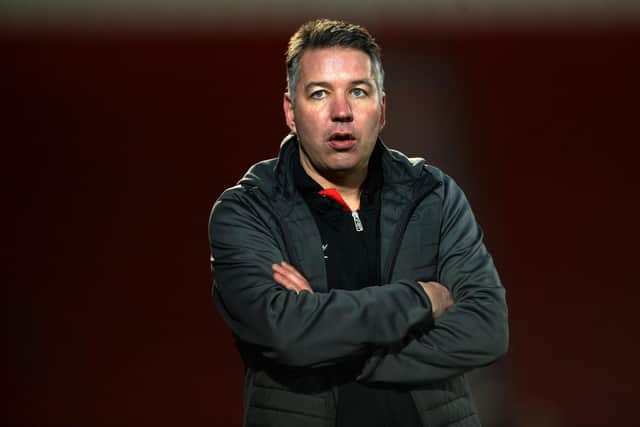

It was an eventful game all round with three players being sent off in the second half including Rovers left back Gareth Roberts.
O’Driscoll topped all that in his second season in charge when Rovers, helped by the increased financial backing of the new directors, fulfilled two of John Ryan’s dreams when they played at Wembley and won promotion back to the second tier for the first time in fifty years.
It was an incredible achievement and they did it the hard way after finishing third by winning the play-offs with a brilliant 5-1 aggregate thrashing of Southend in the semi-final followed by victory over Leeds United in front of 75,132 fans – the biggest crowd ever to watch a Rovers game – in the Wembley final.
Advertisement
Hide AdAdvertisement
Hide AdWhile the ecstatic players celebrated with a showering of champagne their quietly spoken boss was eager to leave the after match press conference as soon as possible because his cup of tea was getting cold!
O’Driscoll, often ill at ease in the spotlight, was never one to bask in the glory and was already thinking of the challenge ahead in the Championship.
Many in the media found him difficult to deal with because he did not fit the stereotype of the conventional manger always ready with a quick quip or handy quote.
He disliked clichés and what he called stupid questions and was quick to remind unsuspecting reporters if they stretched his patience in that regard.
Advertisement
Hide AdAdvertisement
Hide AdBut, for some reason, I seemed to get on with him better than most and he nearly always made himself available or rang me back promptly whenever I called.
The gulf between League One and the Championship was enormous as Rovers found to their cost at the start of the following season despite introducing themselves in style with an unexpected victory at Derby County in front of over 33,000 fans in their opening match.
A run of 11 defeats from their next 15 league games saw them firmly entrenched at the bottom of the table and, although they continued to earn plaudits for the quality of their football, a quick return to the league below seemed likely.
They were still in the doldrums at Christmas and the task looked hopeless but John Ryan told me privately that he was going to back the manager all the way - even if they went down.
Advertisement
Hide AdAdvertisement
Hide AdIt was one of the best decisions he made as O’Driscoll stuck to his footballing principles and instilled some belief in his players as they grew more accustomed to life at a much higher level and they went on an incredible run from Boxing Day winning nine of their next 11 games.
It included victories over Burnley, Southampton and both Sheffield clubs and by the end of the season they had climbed to 14th place.
The following season they finished even higher and were actually challenging for the play-offs when they reached 8th place in March on the same points as Blackpool who went on to make up ground and win promotion to the Premier League via the play-offs.
Rovers, by contrast, only won one of their last six games after being hit by injuries to key players during the closing stages of the season.
Advertisement
Hide AdAdvertisement
Hide AdDuring the course of the campaign Rovers signed quality players like John Oster as well as Jason Shackell, Billy Sharp and Jordan Mutch on loan.
But before the start of the season they sold Richie Wellens and Matt Mills to Leicester and Reading respectively for fees totalling almost £3 million.
It was O’Driscoll’s and Ryan’s contention that they might have made the play-offs and gone on to emulate Blackpool had they managed to hold on to both players and blend them with the new signings.
Ryan, ever the optimist, always felt the Premier League was in touching distance while others believed Rovers were punching above their weight in a division packed with teams with much bigger support and years of experience playing at a higher level.
Advertisement
Hide AdAdvertisement
Hide AdThe latter view gained credence the following season when an injury plagued Rovers squad finished 21st in the table – just one place off a relegation spot – despite shelling out a club record £1.15 million for the permanent signing of Billy Sharp.
With the new directors keen on building a self-sustaining club it was around this time that O’Driscoll floated the idea that Rovers may have to take a step backwards to move forwards again.
If they were to be relegated so be it and rebuild with a greater emphasis on the youth system rather than splashing out on big money signings.
In the end the club’s owners chose a different course altogether and went along with what became known as ‘the experiment’ after O’Driscoll had been sacked after seven games without a win at the start of the 2011/12 season.
Advertisement
Hide AdAdvertisement
Hide AdDean Saunders was appointed manager with local soccer agent Willie McKay helping out by using his contacts to bring in loan and short term contract players in cut price deals.
Several ex-internationals joined the club including Senegal stars El Hadji Diouf and Habib Beye who had both played in the World Cup, but top scorer Billy Sharp left for Southampton in January for an undisclosed fee rumoured to be close to £2 million.
Although there were some successes with excellent wins over Ipswich, Southampton and Nottingham Forest the players could not find the consistency required to climb out of danger and Rovers eventually finished bottom of the table.
Some fans felt that the influx of so many new faces had divided the squad into two camps and at the end of the season John Ryan declared that ‘the experiment’ was over with no fewer than 19 players leaving the club.
Advertisement
Hide AdAdvertisement
Hide AdAfter four seasons in the Championship the club was back in League One but they bounced back in remarkable style to return as champions in 2013 following the craziest finale at Brentford that anyone had ever seen.
Rovers hardly set the world alight with the quality of their football that season and Saunders left to take charge at Wolves in early January but, despite the disruption, the team played with tremendous determination and continued to grind out results.
Saunders had made Rovers a tough team to beat bringing in big centre backs Rob Jones and Jamie McCombe to bolster the defence and when Brian Flynn, who had been scouting for the club, took over as manager he carried on in the same vein.
By the last match Rovers needed a draw to be sure of promotion while Brentford required a win.
Advertisement
Hide AdAdvertisement
Hide AdIt looked to be going to plan for Doncaster as they entered the last minute with the teams goalless but in an extraordinary sequence of events Brentford were awarded a penalty which would have dumped Flynn’s men down into the play-offs.
But Marcello Trotta crashed the spotkick against the crossbar, Rovers cleared the ball upfield and James Coppinger scored to send them up as champions amid scenes of jubilation and disbelief.
Paul Dickov replaced Flynn as manager during the summer but the following season did not go well for Rovers and they were unluckily relegated on goal difference after another dramatic final day.
Rovers were beaten by a dubious penalty at runaway champions Leicester but looked set to survive until Birmingham grabbed a stoppage time goal at Bolton to ensure they stayed up.
Advertisement
Hide AdAdvertisement
Hide AdEarlier in the season John Ryan resigned as chairman and later severed his ties completely following a sad chapter in the history of the club.
The man who stepped in to save the club in 1998 after Ken Richardson had run it into the ground had overseen an extraordinary transformation from the Conference to the Championship with appearances at the Millennium Stadium and Wembley on the way.
In a sense the supporters had never had it so good.
But the relentless ambition of the fanatical fan, who told me at our first meeting around twenty years earlier that he had been driven in business to make money so he could one day plough it into the club, eventually led to his own demise.
Fearing that the promised land of the Premier League was disappearing from sight Ryan desperately sought financial backers who would help him take the final step.
Advertisement
Hide AdAdvertisement
Hide AdIt led to the failure of two takeovers bids and the fallout that followed resulted in him stepping away from the club he had supported since boyhood.
Dickov, the only manager not to bring success to the club in the last 16 years, was replaced by Darren Ferguson in October 2015 after a bad start to the campaign.
Ferguson immediately brought about a revival and lifted the club from the bottom four to the fringe of the play-offs by the start of the New Year but an inexplicable run of defeats saw them tumble back down again and into League Two.
Happily Rovers bounced back to win promotion last year and, with Ferguson at the helm and the backing from the boardroom, the future looks bright.
PLAYERS
Advertisement
Hide AdAdvertisement
Hide AdOne man clearly stands out from the rest – record appearance maker James Coppinger.
The former Darlington trainee was signed by Dave Penney for around £30,000 from Exeter and is still starring for the club at the age of 36 some thirteen years later.
Technically one of the most gifted players to wear a Rovers shirt since the days of Alick Jeffrey he has delighted the crowds with his skills and his uncanny ability to ghost past defenders for more than a decade.
Richie Wellens, Brian Stock and John Oster graced the midfield in the O’Driscoll days and Billy Sharp will always be remembered for his goals and the vests he wore to celebrate.
There are too many to name really.
Advertisement
Hide AdAdvertisement
Hide AdIt was a decade when the fans were blessed by seeing so many outstanding players.
MATCHES
We’ve already mentioned the Millennium and Wembley games and I’ll never forget Coppinger’s memorable hat-trick in the 5-1 play-off semi-final win over Southend.
There was a game at Millwall in February, 2008 which we won 3-0 and dominated to the extent that even the tough home fans applauded.
The JPT two-leg Northern Area Final against Crewe a year earlier was remarkable for the quality of the football in the first half at Gresty Road and the courage shown to come from two goals down at the Keepmoat in the second leg when half the players were exhausted suffering from a ‘flu bug.
Advertisement
Hide AdAdvertisement
Hide AdBilly Sharp’s ‘goal from heaven’ against Middlesbrough three days after the tragic death of his son Luey in November, 2011 provided the most emotional moment ever at the Keepmoat when he unveiled a T-shirt below his vest displaying the words ‘That’s for you son’.
The 34-pass move which led to chants of ole from the fans against QPR two years earlier added credibility to the claim that Rovers were the ‘Arsenal of the North’ under O’Driscoll.
And they did something similar under Paul Dickov against Leeds United when more brilliant possession play led to Billy Sharp sticking the 28th pass into the net in March, 2014.
So that’s it then – half a century covering Doncaster Rovers and it all seems to have gone by in a flash.
Advertisement
Hide AdAdvertisement
Hide AdFrom Alick Jeffrey to John Marquis, from George Raynor to Darren Ferguson and all the players, managers, directors and colourful characters in between.
Thanks for the memories.
READ MORE
A message from the Editor:
Thank you for reading this story on our website. While I have your attention, I also have an important request to make of you.
In order for us to continue to provide high quality and trusted local news on this free-to-read site, I am asking you to also please purchase a copy of our newspaper.
Our journalists are highly trained and our content is independently regulated by IPSO to some of the most rigorous standards in the world. But being your eyes and ears comes at a price. So we need your support more than ever to buy our newspapers during this crisis.
With the coronavirus lockdown having a major impact on many of our local valued advertisers - and consequently the advertising that we receive - we are more reliant than ever on you helping us to provide you with news and information by buying a copy of our newspaper.
Thank you
Nancy Fielder, editor
Comment Guidelines
National World encourages reader discussion on our stories. User feedback, insights and back-and-forth exchanges add a rich layer of context to reporting. Please review our Community Guidelines before commenting.